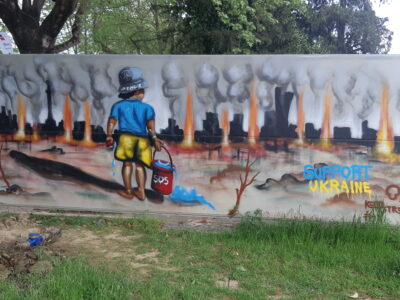Stories about Disinformation
Unfreedom Monitor Report: Philippines
Advox research into digital authoritarianism in the Philippines is now in a report. Read an excerpt and download the full pdf.
Unfreedom Monitor Report: El Salvador
Advox research into digital authoritarianism in El Salvador is now in a report. Read an excerpt and download the full pdf.
Unfreedom Monitor Report: Ecuador
Advox research into digital authoritarianism in Ecuador is now in a report. Read an excerpt and download the full pdf.
Unfreedom Monitor Report: Kazakhstan
Advox research into digital authoritarianism in Kazakhstan is now in a report. Read an excerpt and download the full pdf.
Unfreedom Monitor Report: Myanmar
Advox research into digital authoritarianism in Myanmar is now in a report. Read an excerpt and download the full pdf.
Unfreedom Monitor Report: Cameroon
Advox research into digital authoritarianism in Cameroon is now in a report. Read an excerpt and download the full pdf.
Social media censorship and information manipulation after Sadyr Zhaparov's rise in Kyrgyzstan
The Kyrgyz authorities are also using the narrative of “foreign interests” to adopt a law on ‘foreign agents’ largely inspired by the Russian model.
Unfreedom Monitor Report: Hong Kong
Advox research into digital authoritarianism in Hong Kong is now in a report. Read an excerpt and download the full pdf.
Why tech companies can no longer ignore their role in shaping politics and society
As the influence of tech companies continues to grow, it falls to civil society, journalists, tech users, and watchdog organisations to keep these firms accountable.
The Myanmar junta’s war against Facebook
Social media platforms have an oversized influence on political events such as elections, and they have a responsibility to advance democracy.
Zimbabwe’s information war on digital platforms threatens free expression
"Digital technology has played a huge role in spreading propaganda and disinformation because these offer a huge platform, which appeals to a large number of people."
Online gender-based violence: A tool of digital authoritarianism in India
Women journalists in India have been trolled, received death and rape threats, found themselves objectified on apps, and are allegedly targeted by spyware like Pegasus.
Fake Russian fact-checkers spread propaganda about the war in Ukraine
PolitiFact analyzed this website and found its fact-checks that use well-known techniques of Russian propaganda — incoherence, a large number of claims, repetition of statements on obvious untruths — to confuse the public.
Interview with Romanian anti-disinformation activist reveals disinformation campaigns often target refugees from Ukraine
The position of Romania regarding the war in Ukraine remains in line with the EU and NATO, despite pro-Russian destabilizing efforts. However, at general level, disinformation had become part of political discourse.
Infrastructural content moderation: the case of Mariupol
In addition to the obvious humanitarian consequences that internet shutdowns in a war zone bring, infrastructural content moderation is a potent and dangerous approach to spreading disinformation.
How the Venezuelan government uses social media to cover up its biggest corruption case
Alex Saab’s case has become one of the most relevant incidents to understand Maduro’s propaganda machine in Venezuela, and the effect it has on social and political events.
‘In Ecuador, disinformation has spread like a fungus,’ says Ecuadorian investigative journalist
"Most politicians resort to the tactic of hiring an advertising agency to campaign, but the troll center is part of the deal."
LIVE on November 24: Disinformation and censorship in Russia
Join us on YouTube live on November 24 for a discussion exploring the convergence of Russia’s rapidly strengthening censorship infrastructure, and its use of disinformation both internally and externally.
The love and hate relationship of Hungary's ruling party Fidesz and Facebook
Political analysts argued that the defeat of the opposition resulted from Fidesz’s success in making voters believe that the opposition is serving external interests and would bring Hungary to war.
Turkish lawmakers ratify new disinformation bill
Aimed to combat fake news and disinformation, the 40-article legislation passed by Turkey's parliament, is a threat to freedom of speech say critics of the bill.




















